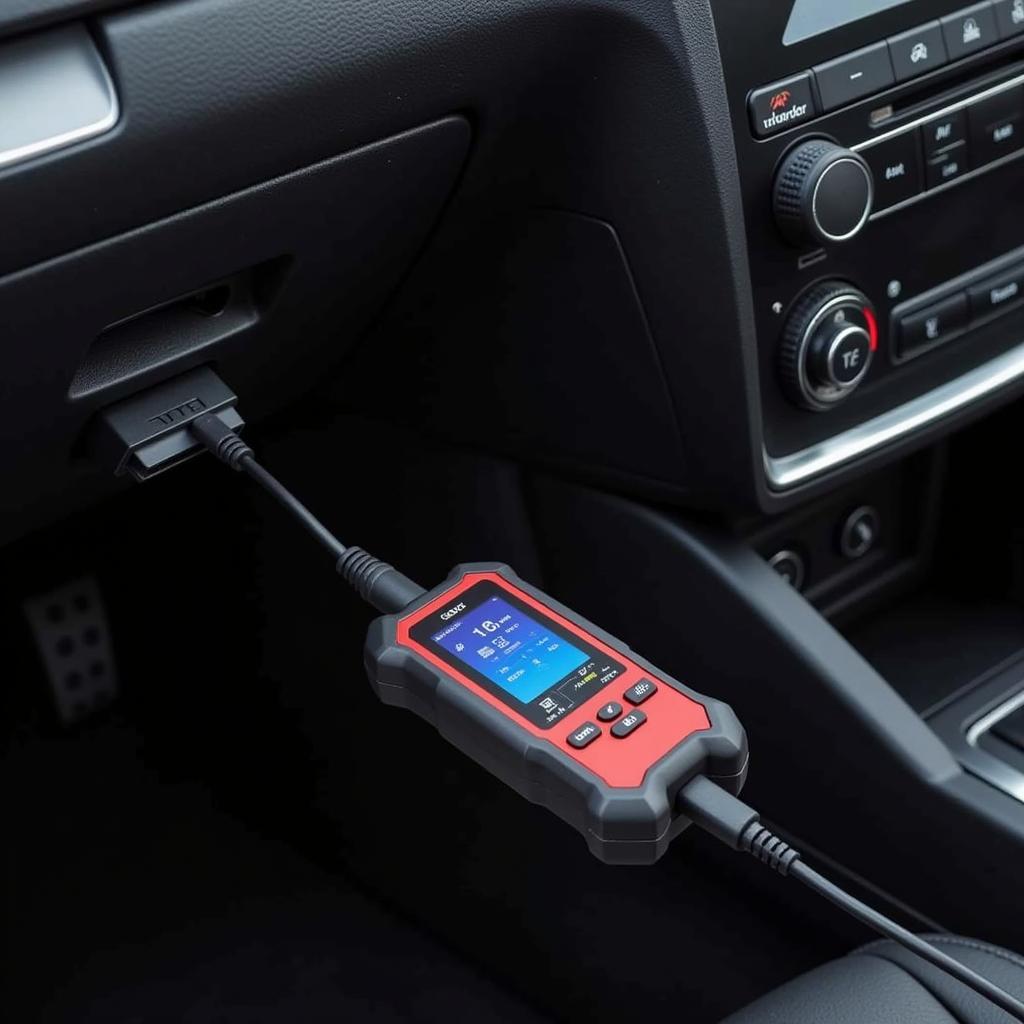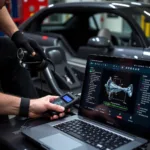External OBD2 scanners have become an indispensable tool for car owners and mechanics alike. Unlike the basic scanners found in some vehicles or those offered as smartphone apps, external OBD2 scanners offer a deeper dive into your vehicle’s health, providing comprehensive data that can pinpoint issues and guide repairs. But with so many options available, choosing the right external OBD2 scanner can be daunting. This guide will delve into the world of external OBD2 scanners, equipping you with the knowledge to make an informed decision for your needs.
What is an External OBD2 Scanner?
An external OBD2 scanner is a diagnostic device that connects to your vehicle’s On-Board Diagnostics II (OBD2) port. This port, typically found under the dashboard on the driver’s side, acts as your car’s data center. When you plug in an external OBD2 scanner, it communicates with your car’s computer, retrieving information about its systems and performance.
Why Choose an External OBD2 Scanner?
While basic code readers can reveal engine trouble codes, external OBD2 scanners go far beyond. They offer a range of benefits, including:
- Detailed Diagnostics: Access a wider range of data points beyond basic engine codes, including transmission, ABS, airbags, and more.
- Live Data Streaming: Monitor real-time sensor readings, like engine RPM, coolant temperature, and oxygen sensor voltage, aiding in diagnosis.
- Enhanced Functionality: Many external scanners offer advanced features like smog readiness checks, battery health analysis, and data logging.
- User-Friendly Interface: Clear displays, intuitive menus, and in some cases, mobile app connectivity, make using and interpreting data straightforward.
Types of External OBD2 Scanners
- Basic Scanners: Affordable and primarily focused on reading and clearing engine codes. Suitable for DIY enthusiasts seeking basic diagnostics.
- Mid-Range Scanners: Offer additional features like live data streaming and some manufacturer-specific codes. Ideal for more in-depth troubleshooting.
- Professional-Grade Scanners: Provide the most comprehensive range of features, including advanced diagnostics, programming capabilities, and bi-directional controls. Designed for professional mechanics and experienced DIYers.
Factors to Consider When Choosing an External OBD2 Scanner
- Vehicle Compatibility: Ensure the scanner is compatible with your vehicle’s make, model, and year, as some scanners are tailored for specific brands.
- Features: Determine which features are essential for your needs, such as live data, ABS diagnostics, or manufacturer-specific codes.
- Software Updates: Opt for scanners that offer regular software updates to ensure compatibility with newer vehicles and address potential bugs.
- User Interface: Choose a scanner with a user-friendly interface that aligns with your technical expertise.
- Price: External OBD2 scanners come in a wide price range. Set a budget based on your needs and intended usage.
How to Use an External OBD2 Scanner
Using an external OBD2 scanner is generally straightforward:
- Locate your vehicle’s OBD2 port.
- Turn the ignition on but do not start the engine.
- Connect the scanner to the OBD2 port.
- Turn on the scanner and follow the on-screen prompts to select the desired function.
Common Uses for External OBD2 Scanners
- Diagnosing Check Engine Light: Identify the root cause of the dreaded check engine light, saving time and money on unnecessary repairs.
- Monitoring Vehicle Performance: Track engine parameters, fuel efficiency, and other data to optimize performance and fuel economy.
- Troubleshooting Sensor Issues: Identify faulty sensors by analyzing live data streams and comparing readings to manufacturer specifications.
- DIY Maintenance: Perform basic maintenance tasks like resetting oil life indicators and monitoring battery health.
External OBD2 Scanners: A Valuable Investment
Investing in an external OBD2 scanner can be a wise decision for any car owner. Whether you’re a DIY enthusiast looking to save on repair costs or a professional mechanic seeking advanced diagnostic tools, a reliable external OBD2 scanner can empower you with valuable information about your vehicle’s health and performance. By understanding the different types of scanners available, their features, and your individual needs, you can choose the right one to keep your car running smoothly for miles to come.
Frequently Asked Questions
Q: Can I use any OBD2 scanner on any car?
A: Not necessarily. While all cars manufactured after 1996 in the US are required to have an OBD2 port, there may be variations in protocols. It’s essential to choose a scanner that is compatible with your specific make, model, and year.
Q: Will using an external OBD2 scanner void my car’s warranty?
A: No, using an OBD2 scanner will not void your car’s warranty. These devices simply read data from your car’s computer and do not make any modifications that would affect the warranty.
Q: Can I use an external OBD2 scanner to clear fault codes?
A: Yes, most external OBD2 scanners allow you to clear fault codes. However, it’s important to address the underlying issue causing the code before clearing it. Simply erasing the code without fixing the problem will likely result in it returning.
Q: Do I need a professional mechanic to use an external OBD2 scanner?
A: Not necessarily. Many external OBD2 scanners are designed to be user-friendly, even for DIY enthusiasts. However, some professional-grade scanners offer advanced features that may require more technical expertise.
Q: How often should I use my external OBD2 scanner?
A: It’s a good practice to scan your vehicle periodically, even if you haven’t noticed any issues. This can help detect potential problems early on, before they escalate into major repairs.
Still have questions?
We’re here to help! Contact our team of car diagnostic experts 24/7 via WhatsApp at +1(641)206-8880 or email us at [email protected]. We’re dedicated to providing you with the support and information you need to make informed decisions about your vehicle’s health.

